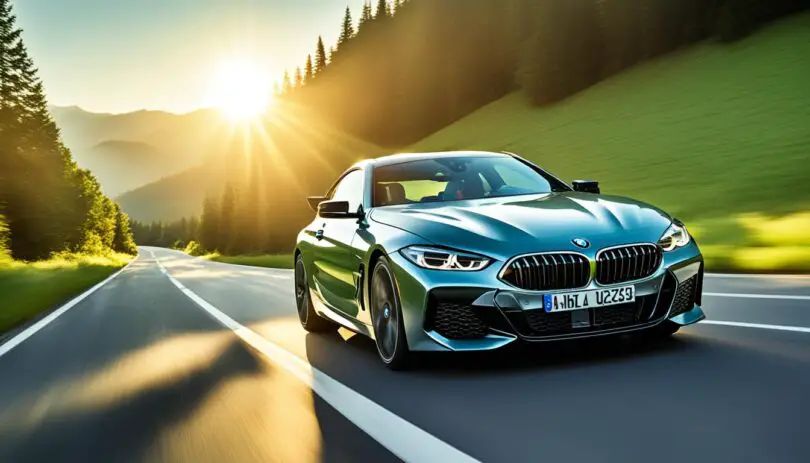As a renowned brand in the automotive industry, BMW has built a reputation for producing high-quality and durable vehicles. For car enthusiasts and potential buyers, it is natural to wonder about the longevity of BMWs and the mileage they can achieve before reaching the end of their lifespan.
According to experts at MotorAsk.com, most BMW vehicles last for an average of 10-15 years, with proper maintenance. With good care and regular service, some BMWs can even surpass this timeframe. In terms of mileage, BMWs typically perform well, averaging between 100,000 and 150,000 miles. However, there have been cases where BMWs have exceeded 200,000 miles.
While BMWs are known for their durability, it’s important to note that they may not be the most long-lasting option compared to some other manufacturers. Nevertheless, BMWs strike a balance between longevity and value, offering a reliable and enjoyable driving experience for many years.
Key Takeaways:
- Most BMW vehicles last for 10-15 years with proper maintenance.
- BMW mileage typically ranges from 100,000 to 150,000 miles.
- Some BMWs can exceed 200,000 miles with good care.
- While not the most durable option, BMWs offer a balance between longevity and value.
- Regular maintenance is crucial for maximizing the lifespan of a BMW.
How Do BMW Lifespans Compare With Other Manufacturers?
When it comes to durability and longevity, BMW has established itself as a reliable brand. However, how does it fare against other manufacturers in terms of lifespan? Let’s delve into a comparative analysis to find out.
According to a study conducted by ISeeCars.com, BMW does not rank among the most durable vehicle manufacturers. While this may seem disheartening, it is important to consider the advantages of not being the most durable. Long-lasting vehicles may become outdated before reaching the end of their lifespan, making it necessary to find a balance between durability and value. BMW precisely strikes that balance, offering a vehicle that is both durable and timeless in its design.
Brands like Toyota and Honda are known for their exceptional durability. However, they may not offer the same level of luxury and performance that BMW provides. With BMW, owners get the best of both worlds, as their vehicles are built to last while delivering the driving experience that BMW enthusiasts have come to expect.
“BMW strikes a balance between durability and value, even if it doesn’t last as long as brands like Toyota or Honda.”
Comparing BMW Durability to Other Brands
When comparing BMW to other brands in terms of durability, it’s important to take into account various factors, including build quality, engineering, and materials used. While BMW vehicles may not have the same reputation for longevity as some competitors, they are still renowned for their solid construction and performance. BMWs are designed with high-quality materials and precise engineering to ensure their durability on the road.
The Longevity of BMW vs. Competitors
When it comes to the longevity of BMW vehicles compared to competitors, it ultimately depends on how well the car is maintained and driven. Following the recommended maintenance schedule, regular inspections, and using quality parts are all vital for extending the lifespan of a BMW. With proper care, BMWs can easily surpass the 100,000-mile mark and continue to perform well beyond that.
While BMW may not boast the longest lifespan among its competitors, it’s important to remember that durability is just one aspect when considering the value of a vehicle. BMW offers a blend of luxury, performance, and durability that sets it apart from others in the market.
Longest Lasting BMW Models
When it comes to durability and reliability, BMW has a reputation for producing vehicles that stand the test of time. If you’re looking for the longest lasting and most reliable BMW models, HotCars.com has compiled a list of standout performers from different model years.
- 2006 BMW E90 330i: This iconic BMW model is known for its superior build quality and longevity. With proper care, the E90 330i can provide many years of reliable performance.
- 2018 BMW i3: The i3, BMW’s electric car, has impressed owners with its long-lasting powertrain and innovative technology. It’s a great choice for eco-conscious drivers seeking durability.
- 2019 BMW F40: This recent addition to the BMW lineup has quickly established itself as a reliable and long-lasting model. Its sleek design and advanced features make it a standout choice for those seeking longevity.
- 2005 BMW 325i: Known for its excellent balance of performance and reliability, the 325i is a popular choice among BMW enthusiasts. Its robust engine and solid construction contribute to its long lifespan.
- 2016 BMW M4: As part of BMW’s high-performance M lineup, the M4 delivers impressive longevity while offering thrilling driving dynamics. It’s a testament to BMW’s commitment to producing reliable sports cars.
| Model | Year |
|---|---|
| 2006 BMW E90 330i | 2006 |
| 2018 BMW i3 | 2018 |
| 2019 BMW F40 | 2019 |
| 2005 BMW 325i | 2005 |
| 2016 BMW M4 | 2016 |
These models represent the longevity and reliability BMW vehicles are known for. Whether you’re a fan of classic models or interested in the latest innovations, you can trust that BMW consistently produces durable cars that can withstand the test of time.
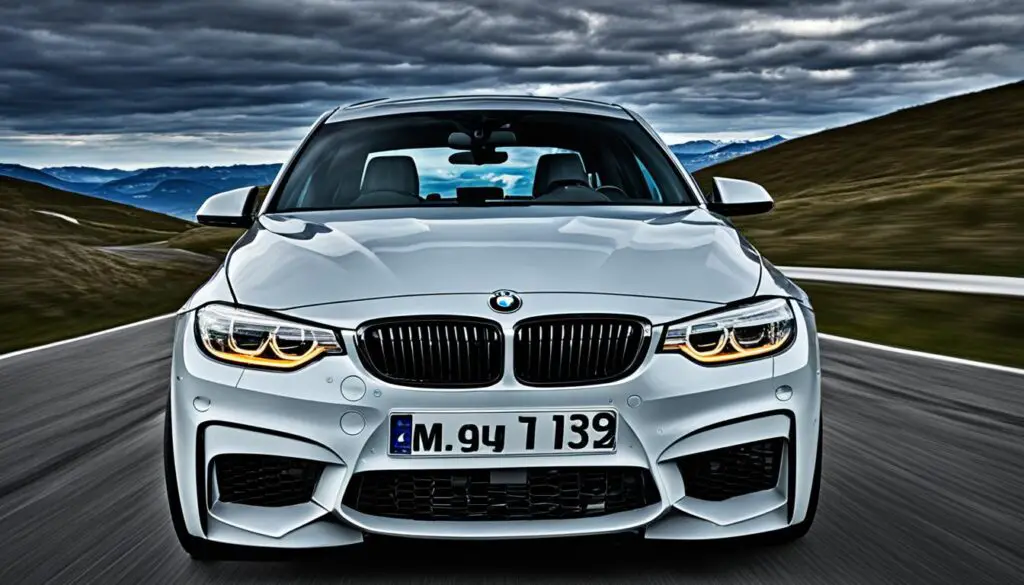
BMW Models With The Shortest Lifespan
When it comes to BMW models with the shortest lifespan, the BMW Series 7 consistently stands out, according to BMWBlog.com. Despite being designed to showcase advances in design and technology, the Series 7 does not perform as well as expected in these areas. It is important to note that even BMW models with shorter lifespans still offer good value and may not become outdated as quickly as longer-lasting vehicles.
BMW Series 7 Lifespan Comparison
Let’s take a closer look at the BMW Series 7 and compare its lifespan to other BMW models:
| BMW Model | Lifespan |
|---|---|
| BMW Series 7 | Shorter lifespan compared to other BMW models |
| BMW 3 Series | Longevity exceeds that of the Series 7 |
| BMW 5 Series | Longer lifespan compared to the Series 7 |
| BMW X5 | Longevity surpasses that of the Series 7 |
As we can see from the comparison table above, the BMW Series 7 falls short in terms of lifespan when compared to other popular BMW models like the 3 Series, 5 Series, and X5. However, it’s worth noting that even though the Series 7 may have a shorter lifespan, it still offers excellent value and performance, making it a worthwhile choice for many BMW enthusiasts.
“Despite its shorter lifespan, the BMW Series 7 remains an attractive option for those seeking luxury, advanced features, and a prestigious brand.”
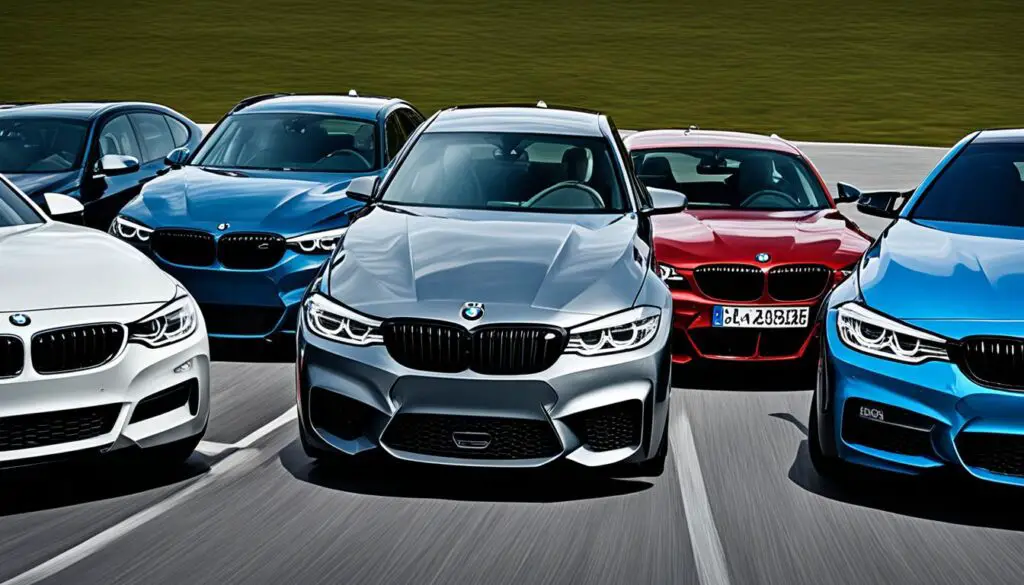
With the visually appealing image of various BMW models, you can see the range and diversity that BMW offers to its customers.
How Can You Help Your BMW Last Longer?
Good maintenance practices can help enhance the lifespan of your BMW. By following these tips, you can extend the longevity of your beloved vehicle and ensure its durability for years to come.
1. Regular Maintenance Tasks
To keep your BMW in top condition, it’s important to perform basic maintenance tasks regularly. This includes:
- Regularly changing the oil to keep the engine running smoothly
- Monitoring coolant levels to prevent overheating
- Replacing air filters to maintain optimal performance
- Checking and replacing the spark plugs as needed
2. Defensive Driving and Gentle Acceleration
Protecting the internal components of your BMW can significantly impact its lifespan. By practicing defensive driving techniques and gently accelerating and braking, you can reduce stress on the engine and transmission, leading to improved durability over time.
3. Adhere to the Manufacturer’s Recommended Maintenance Schedule
Following the manufacturer’s recommended maintenance schedule is crucial for maximizing the longevity of your BMW. This includes routine inspections, fluid changes, and other preventative measures. By staying on top of these recommendations, you can address any potential issues before they become major problems.
4. Listen to Your Mechanic’s Advice
Your mechanic is a valuable resource when it comes to maintaining your BMW. Listen to their advice and recommendations for any repairs or replacements that may be needed. They have the expertise to identify potential issues and help you address them promptly.
5. Use Quality Parts for Repairs
When it comes to repairs, it’s essential to use quality parts that are specifically designed for your BMW. Opting for genuine OEM (Original Equipment Manufacturer) parts will ensure the best fit and performance, ultimately extending the lifespan of your vehicle.
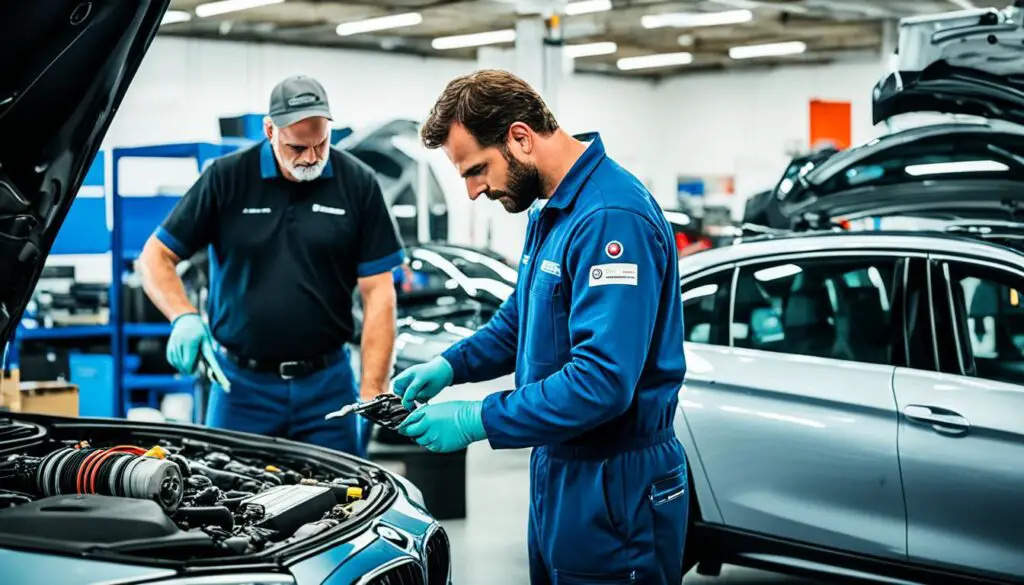
By following these maintenance tips and implementing these durability enhancements, you can help your BMW last longer and enjoy the ultimate driving experience for years to come.
BMW Longevity and Maintenance Costs
When considering the longevity of a BMW, it’s important to also take into account the associated maintenance costs. While BMWs are known for their performance and luxury, they do come with higher maintenance expenses compared to other cars.
According to RepairPal, the annual maintenance costs for a typical BMW vehicle range from £1,000 to £1,700. This includes expenses for labor, parts, and repairs. It’s worth noting that different BMW models may have varying maintenance requirements, which can impact the overall expenses.
Specific maintenance items such as brake pad replacement and tire longevity can also affect the costs. These expenses will vary depending on the specific BMW model and an individual’s driving habits.
Therefore, it’s crucial for BMW owners to budget for higher maintenance costs when owning a BMW. It’s recommended to keep these expenses in mind when assessing the overall value and affordability of a BMW.
Proper maintenance and regular servicing are essential for keeping a BMW in optimal condition and maximizing its longevity. It’s advisable to adhere to the manufacturer’s recommended service schedule and consult with certified BMW technicians for expert guidance.
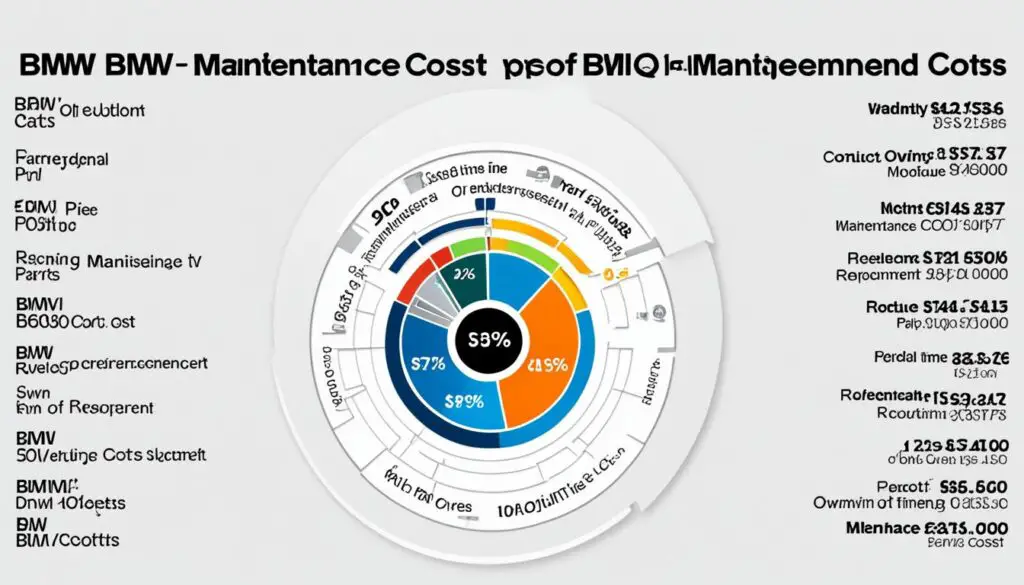
Advantages of Owning a BMW Despite Higher Maintenance Costs
“Owning a BMW may come with higher maintenance costs, but it’s important to consider the advantages it offers. BMWs are renowned for their performance, luxury, and advanced features. The joy of driving a BMW and the satisfaction it brings often outweigh the higher maintenance expenses for many owners.”
BMW Engine and Transmission Lifespan
When it comes to the lifespan of BMW engines and transmissions, proper maintenance plays a crucial role. Adhering to BMW’s recommended service schedule can result in engines lasting well over 200,000 miles. In fact, some BMW owners have reported their engines lasting over 300,000 miles with good care and regular maintenance.
Similar to engines, BMW transmissions can also last the entire lifespan of the vehicle. The key to extending the longevity of BMW transmissions is to change the transmission fluid every 30,000 to 60,000 miles. This regular maintenance task helps to keep the transmission running smoothly and improves its overall lifespan.
Regular inspections are vital for identifying any potential transmission issues early on. By addressing these issues promptly, you can prevent further damage and ensure the longevity of both the engine and transmission.
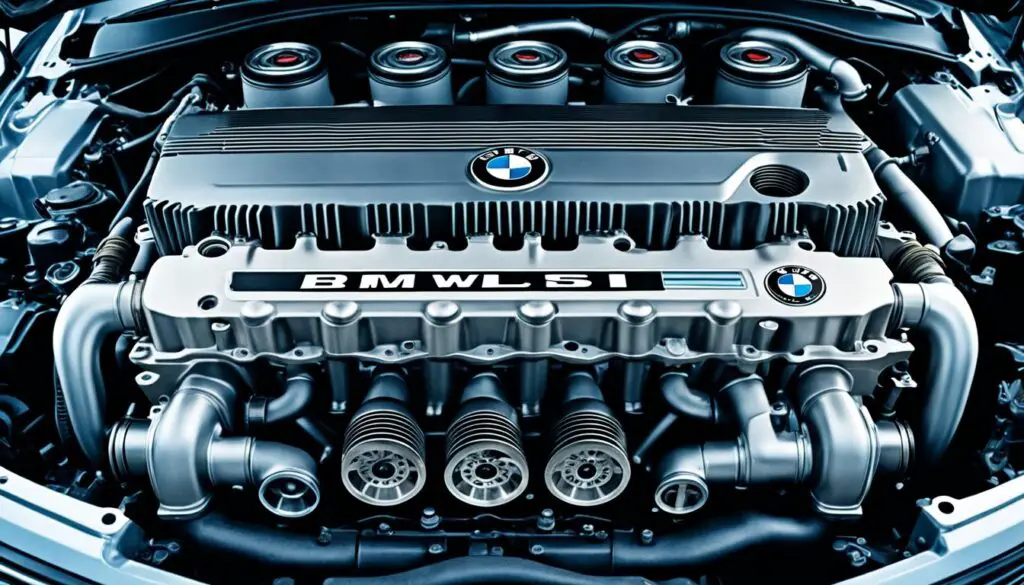
Overall, with proper care and maintenance, BMW engines and transmissions are built to last. These critical components of a BMW vehicle have the potential to perform well and endure for the entire lifetime of the vehicle.
BMW Lifespan vs Honda Lifespan
When comparing the lifespan of BMWs and Hondas, both brands have the potential to last well beyond 200,000 miles with proper maintenance. BMWs are often associated with quality, while Hondas are renowned for their reliability. However, there is no evidence to suggest that BMWs inherently last longer than Hondas. The lifespan of both brands ultimately depends on how well they are maintained and cared for.
Honda vehicles are known for their longevity and can easily reach high mileage when properly taken care of. Similarly, BMWs can also achieve impressive mileage with regular maintenance and servicing. However, it is important to note that BMWs tend to have higher maintenance costs compared to Hondas. These costs can be attributed to factors such as specialized parts and a higher standard of luxury and performance.
“While BMWs are often associated with quality and Hondas with reliability, there is no evidence to suggest that BMWs last longer than Hondas.”
Overall, the durability and longevity of both BMWs and Hondas rely heavily on routine maintenance and adherence to the manufacturer’s recommended service schedule. Regular oil changes, inspections, and addressing any issues promptly can significantly extend the lifespan of both brands.
The Importance of Routine Maintenance
Regular maintenance tasks play a vital role in preserving the lifespan of both BMWs and Hondas. Here are some essential maintenance tips that should be followed:
- Regularly change the engine oil to keep it clean and lubricated.
- Replace the air filter to ensure optimal engine performance.
- Inspect and rotate the tires for even wear.
- Monitor the coolant levels and top up as necessary.
- Keep up with transmission fluid changes to avoid potential issues.
- Check and replace worn-out brake pads for safe braking.
- Follow the manufacturer’s recommended service schedule for specific maintenance tasks.
By following these maintenance practices, both BMWs and Hondas can achieve their maximum lifespan potential and deliver reliable performance for many years to come.
Comparative Durability and Maintenance Costs
While it is difficult to directly compare the durability of BMWs and Hondas, it is worth noting that BMWs often require more expensive maintenance. BMWs are built with higher-end components, advanced technologies, and luxury features that may contribute to higher maintenance costs.
According to RepairPal, the average annual maintenance costs for BMW vehicles range from £1,000 to £1,700. These costs include labor, parts, and repairs. On the other hand, Honda vehicles tend to have lower maintenance costs due to their more affordable parts and wider availability.
| BMW | Honda | |
|---|---|---|
| Average Annual Maintenance Cost | £1,000 – £1,700 | £500 – £1,200 |
| Specialized Parts | Yes | No |
| Performance Aspects | High-end | Depends on the Model |
Table: Comparative Durability and Maintenance Costs between BMW and Honda
It’s important to understand that maintenance costs can vary based on the specific model and age of the vehicle. However, in general, Honda vehicles tend to be more affordable to maintain compared to BMWs.
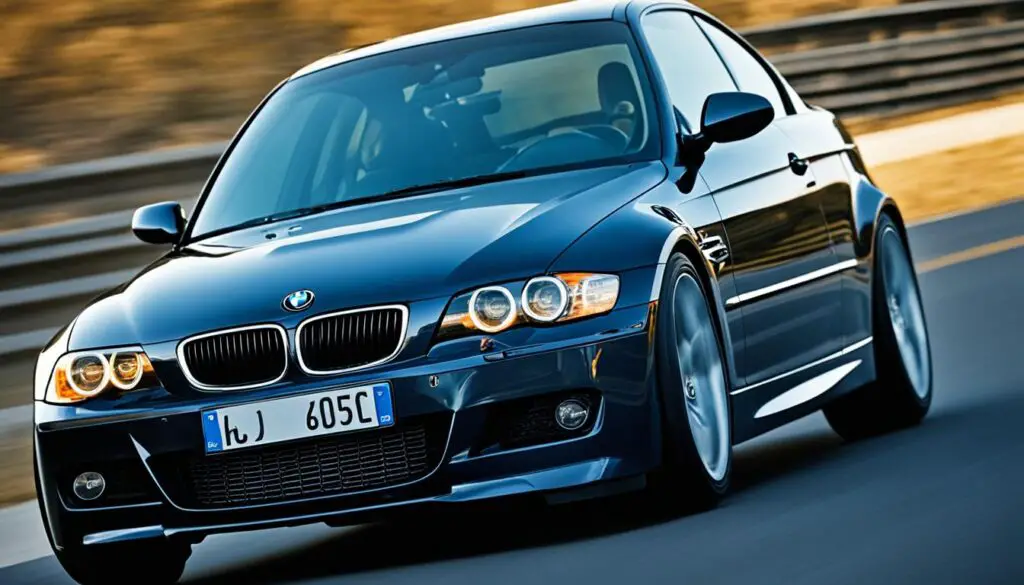
Conclusion
BMW’s reputation for durability and longevity is well-deserved. Most BMW models can last for a minimum of 10-15 years and cover a range of 100,000 to 150,000 miles. While BMW vehicles may not be the most durable compared to other manufacturers, they still offer excellent value and performance.
To ensure your BMW lasts as long as possible, it’s crucial to prioritize proper maintenance practices. Adhering to the recommended service schedule, using quality parts, and following your mechanic’s advice are essential factors in maximizing the longevity of your BMW. With regular upkeep, owners can expect their BMWs to easily exceed 200,000 miles, and some enthusiasts have reported their vehicles lasting over an impressive 300,000 miles.
Summary of BMW Longevity Factors:
1. Good Value and Performance: BMWs provide a great balance between durability and performance, making them an attractive choice for car enthusiasts.
2. Proper Maintenance Practices: Regular servicing, oil changes, and regular inspections are crucial for keeping your BMW running smoothly and extending its lifespan.
3. Adherence to Recommended Service Schedule: Following BMW’s recommended service schedule ensures that your vehicle receives the necessary attention at specific mileage intervals.
4. Quality Parts: Using high-quality parts for repairs and replacements helps maintain the performance and longevity of BMW vehicles.
Investing in a BMW not only guarantees a reliable and long-lasting vehicle but also offers a luxurious driving experience. By taking care of your BMW and providing it with proper maintenance, you can enjoy years of reliable performance on the road.
FAQ
How long do BMWs typically last?
What is the average mileage BMWs can reach?
How does BMW’s durability compare to other manufacturers?
Which are the longest lasting BMW models?
Which BMW models have the shortest lifespan?
How can I help my BMW last longer?
How much does it cost to maintain a BMW?
FAQ
How long do BMWs typically last?
Most BMW vehicles last at least 10-15 years, and some can last longer with good maintenance practices.
What is the average mileage BMWs can reach?
BMWs typically make it through 100k-150k miles, but some can reach 200k miles or more with proper care.
How does BMW’s durability compare to other manufacturers?
BMW vehicles perform better than average in terms of durability but are not the most durable compared to other manufacturers.
Which are the longest lasting BMW models?
Some of the longest lasting and most reliable BMW models include the 2006 BMW E90 330i, 2018 BMW i3, 2019 BMW F40, 2005 BMW 325i, and 2016 BMW M4.
Which BMW models have the shortest lifespan?
The BMW Series 7 consistently offers some of the shortest lifespans in BMW’s lineup due to issues with design and technology advancements.
How can I help my BMW last longer?
Good maintenance practices such as regular oil changes, monitoring coolant levels, defensive driving, and gentle acceleration and braking can enhance the lifespan of your BMW.
How much does it cost to maintain a BMW?
Annual maintenance costs for a typical BMW range from
FAQ
How long do BMWs typically last?
Most BMW vehicles last at least 10-15 years, and some can last longer with good maintenance practices.
What is the average mileage BMWs can reach?
BMWs typically make it through 100k-150k miles, but some can reach 200k miles or more with proper care.
How does BMW’s durability compare to other manufacturers?
BMW vehicles perform better than average in terms of durability but are not the most durable compared to other manufacturers.
Which are the longest lasting BMW models?
Some of the longest lasting and most reliable BMW models include the 2006 BMW E90 330i, 2018 BMW i3, 2019 BMW F40, 2005 BMW 325i, and 2016 BMW M4.
Which BMW models have the shortest lifespan?
The BMW Series 7 consistently offers some of the shortest lifespans in BMW’s lineup due to issues with design and technology advancements.
How can I help my BMW last longer?
Good maintenance practices such as regular oil changes, monitoring coolant levels, defensive driving, and gentle acceleration and braking can enhance the lifespan of your BMW.
How much does it cost to maintain a BMW?
Annual maintenance costs for a typical BMW range from $1,000 to $1,700, including labor, parts, and repairs. Brake pad replacement and tire longevity expenses may vary.
How long do BMW engines and transmissions last?
With proper care and maintenance, BMW engines can last well over 200,000-300,000 miles, and transmissions can last the lifespan of the vehicle.
Do BMWs last longer than Hondas?
There is no evidence to suggest that BMWs last longer than Hondas. The lifespan of both brands depends on maintenance, although BMWs tend to have higher maintenance costs.
,000 to
FAQ
How long do BMWs typically last?
Most BMW vehicles last at least 10-15 years, and some can last longer with good maintenance practices.
What is the average mileage BMWs can reach?
BMWs typically make it through 100k-150k miles, but some can reach 200k miles or more with proper care.
How does BMW’s durability compare to other manufacturers?
BMW vehicles perform better than average in terms of durability but are not the most durable compared to other manufacturers.
Which are the longest lasting BMW models?
Some of the longest lasting and most reliable BMW models include the 2006 BMW E90 330i, 2018 BMW i3, 2019 BMW F40, 2005 BMW 325i, and 2016 BMW M4.
Which BMW models have the shortest lifespan?
The BMW Series 7 consistently offers some of the shortest lifespans in BMW’s lineup due to issues with design and technology advancements.
How can I help my BMW last longer?
Good maintenance practices such as regular oil changes, monitoring coolant levels, defensive driving, and gentle acceleration and braking can enhance the lifespan of your BMW.
How much does it cost to maintain a BMW?
Annual maintenance costs for a typical BMW range from $1,000 to $1,700, including labor, parts, and repairs. Brake pad replacement and tire longevity expenses may vary.
How long do BMW engines and transmissions last?
With proper care and maintenance, BMW engines can last well over 200,000-300,000 miles, and transmissions can last the lifespan of the vehicle.
Do BMWs last longer than Hondas?
There is no evidence to suggest that BMWs last longer than Hondas. The lifespan of both brands depends on maintenance, although BMWs tend to have higher maintenance costs.
,700, including labor, parts, and repairs. Brake pad replacement and tire longevity expenses may vary.
How long do BMW engines and transmissions last?
With proper care and maintenance, BMW engines can last well over 200,000-300,000 miles, and transmissions can last the lifespan of the vehicle.
Do BMWs last longer than Hondas?
There is no evidence to suggest that BMWs last longer than Hondas. The lifespan of both brands depends on maintenance, although BMWs tend to have higher maintenance costs.
FAQ
How long do BMWs typically last?
Most BMW vehicles last at least 10-15 years, and some can last longer with good maintenance practices.
What is the average mileage BMWs can reach?
BMWs typically make it through 100k-150k miles, but some can reach 200k miles or more with proper care.
How does BMW’s durability compare to other manufacturers?
BMW vehicles perform better than average in terms of durability but are not the most durable compared to other manufacturers.
Which are the longest lasting BMW models?
Some of the longest lasting and most reliable BMW models include the 2006 BMW E90 330i, 2018 BMW i3, 2019 BMW F40, 2005 BMW 325i, and 2016 BMW M4.
Which BMW models have the shortest lifespan?
The BMW Series 7 consistently offers some of the shortest lifespans in BMW’s lineup due to issues with design and technology advancements.
How can I help my BMW last longer?
Good maintenance practices such as regular oil changes, monitoring coolant levels, defensive driving, and gentle acceleration and braking can enhance the lifespan of your BMW.
How much does it cost to maintain a BMW?
Annual maintenance costs for a typical BMW range from
FAQ
How long do BMWs typically last?
Most BMW vehicles last at least 10-15 years, and some can last longer with good maintenance practices.
What is the average mileage BMWs can reach?
BMWs typically make it through 100k-150k miles, but some can reach 200k miles or more with proper care.
How does BMW’s durability compare to other manufacturers?
BMW vehicles perform better than average in terms of durability but are not the most durable compared to other manufacturers.
Which are the longest lasting BMW models?
Some of the longest lasting and most reliable BMW models include the 2006 BMW E90 330i, 2018 BMW i3, 2019 BMW F40, 2005 BMW 325i, and 2016 BMW M4.
Which BMW models have the shortest lifespan?
The BMW Series 7 consistently offers some of the shortest lifespans in BMW’s lineup due to issues with design and technology advancements.
How can I help my BMW last longer?
Good maintenance practices such as regular oil changes, monitoring coolant levels, defensive driving, and gentle acceleration and braking can enhance the lifespan of your BMW.
How much does it cost to maintain a BMW?
Annual maintenance costs for a typical BMW range from $1,000 to $1,700, including labor, parts, and repairs. Brake pad replacement and tire longevity expenses may vary.
How long do BMW engines and transmissions last?
With proper care and maintenance, BMW engines can last well over 200,000-300,000 miles, and transmissions can last the lifespan of the vehicle.
Do BMWs last longer than Hondas?
There is no evidence to suggest that BMWs last longer than Hondas. The lifespan of both brands depends on maintenance, although BMWs tend to have higher maintenance costs.
,000 to
FAQ
How long do BMWs typically last?
Most BMW vehicles last at least 10-15 years, and some can last longer with good maintenance practices.
What is the average mileage BMWs can reach?
BMWs typically make it through 100k-150k miles, but some can reach 200k miles or more with proper care.
How does BMW’s durability compare to other manufacturers?
BMW vehicles perform better than average in terms of durability but are not the most durable compared to other manufacturers.
Which are the longest lasting BMW models?
Some of the longest lasting and most reliable BMW models include the 2006 BMW E90 330i, 2018 BMW i3, 2019 BMW F40, 2005 BMW 325i, and 2016 BMW M4.
Which BMW models have the shortest lifespan?
The BMW Series 7 consistently offers some of the shortest lifespans in BMW’s lineup due to issues with design and technology advancements.
How can I help my BMW last longer?
Good maintenance practices such as regular oil changes, monitoring coolant levels, defensive driving, and gentle acceleration and braking can enhance the lifespan of your BMW.
How much does it cost to maintain a BMW?
Annual maintenance costs for a typical BMW range from $1,000 to $1,700, including labor, parts, and repairs. Brake pad replacement and tire longevity expenses may vary.
How long do BMW engines and transmissions last?
With proper care and maintenance, BMW engines can last well over 200,000-300,000 miles, and transmissions can last the lifespan of the vehicle.
Do BMWs last longer than Hondas?
There is no evidence to suggest that BMWs last longer than Hondas. The lifespan of both brands depends on maintenance, although BMWs tend to have higher maintenance costs.
,700, including labor, parts, and repairs. Brake pad replacement and tire longevity expenses may vary.
How long do BMW engines and transmissions last?
With proper care and maintenance, BMW engines can last well over 200,000-300,000 miles, and transmissions can last the lifespan of the vehicle.
Do BMWs last longer than Hondas?
There is no evidence to suggest that BMWs last longer than Hondas. The lifespan of both brands depends on maintenance, although BMWs tend to have higher maintenance costs.
FAQ
How long do BMWs typically last?
Most BMW vehicles last at least 10-15 years, and some can last longer with good maintenance practices.
What is the average mileage BMWs can reach?
BMWs typically make it through 100k-150k miles, but some can reach 200k miles or more with proper care.
How does BMW’s durability compare to other manufacturers?
BMW vehicles perform better than average in terms of durability but are not the most durable compared to other manufacturers.
Which are the longest lasting BMW models?
Some of the longest lasting and most reliable BMW models include the 2006 BMW E90 330i, 2018 BMW i3, 2019 BMW F40, 2005 BMW 325i, and 2016 BMW M4.
Which BMW models have the shortest lifespan?
The BMW Series 7 consistently offers some of the shortest lifespans in BMW’s lineup due to issues with design and technology advancements.
How can I help my BMW last longer?
Good maintenance practices such as regular oil changes, monitoring coolant levels, defensive driving, and gentle acceleration and braking can enhance the lifespan of your BMW.
How much does it cost to maintain a BMW?
Annual maintenance costs for a typical BMW range from
FAQ
How long do BMWs typically last?
Most BMW vehicles last at least 10-15 years, and some can last longer with good maintenance practices.
What is the average mileage BMWs can reach?
BMWs typically make it through 100k-150k miles, but some can reach 200k miles or more with proper care.
How does BMW’s durability compare to other manufacturers?
BMW vehicles perform better than average in terms of durability but are not the most durable compared to other manufacturers.
Which are the longest lasting BMW models?
Some of the longest lasting and most reliable BMW models include the 2006 BMW E90 330i, 2018 BMW i3, 2019 BMW F40, 2005 BMW 325i, and 2016 BMW M4.
Which BMW models have the shortest lifespan?
The BMW Series 7 consistently offers some of the shortest lifespans in BMW’s lineup due to issues with design and technology advancements.
How can I help my BMW last longer?
Good maintenance practices such as regular oil changes, monitoring coolant levels, defensive driving, and gentle acceleration and braking can enhance the lifespan of your BMW.
How much does it cost to maintain a BMW?
Annual maintenance costs for a typical BMW range from $1,000 to $1,700, including labor, parts, and repairs. Brake pad replacement and tire longevity expenses may vary.
How long do BMW engines and transmissions last?
With proper care and maintenance, BMW engines can last well over 200,000-300,000 miles, and transmissions can last the lifespan of the vehicle.
Do BMWs last longer than Hondas?
There is no evidence to suggest that BMWs last longer than Hondas. The lifespan of both brands depends on maintenance, although BMWs tend to have higher maintenance costs.
,000 to
FAQ
How long do BMWs typically last?
Most BMW vehicles last at least 10-15 years, and some can last longer with good maintenance practices.
What is the average mileage BMWs can reach?
BMWs typically make it through 100k-150k miles, but some can reach 200k miles or more with proper care.
How does BMW’s durability compare to other manufacturers?
BMW vehicles perform better than average in terms of durability but are not the most durable compared to other manufacturers.
Which are the longest lasting BMW models?
Some of the longest lasting and most reliable BMW models include the 2006 BMW E90 330i, 2018 BMW i3, 2019 BMW F40, 2005 BMW 325i, and 2016 BMW M4.
Which BMW models have the shortest lifespan?
The BMW Series 7 consistently offers some of the shortest lifespans in BMW’s lineup due to issues with design and technology advancements.
How can I help my BMW last longer?
Good maintenance practices such as regular oil changes, monitoring coolant levels, defensive driving, and gentle acceleration and braking can enhance the lifespan of your BMW.
How much does it cost to maintain a BMW?
Annual maintenance costs for a typical BMW range from $1,000 to $1,700, including labor, parts, and repairs. Brake pad replacement and tire longevity expenses may vary.
How long do BMW engines and transmissions last?
With proper care and maintenance, BMW engines can last well over 200,000-300,000 miles, and transmissions can last the lifespan of the vehicle.
Do BMWs last longer than Hondas?
There is no evidence to suggest that BMWs last longer than Hondas. The lifespan of both brands depends on maintenance, although BMWs tend to have higher maintenance costs.
,700, including labor, parts, and repairs. Brake pad replacement and tire longevity expenses may vary.
How long do BMW engines and transmissions last?
With proper care and maintenance, BMW engines can last well over 200,000-300,000 miles, and transmissions can last the lifespan of the vehicle.
Do BMWs last longer than Hondas?
There is no evidence to suggest that BMWs last longer than Hondas. The lifespan of both brands depends on maintenance, although BMWs tend to have higher maintenance costs.
FAQ
How long do BMWs typically last?
Most BMW vehicles last at least 10-15 years, and some can last longer with good maintenance practices.
What is the average mileage BMWs can reach?
BMWs typically make it through 100k-150k miles, but some can reach 200k miles or more with proper care.
How does BMW’s durability compare to other manufacturers?
BMW vehicles perform better than average in terms of durability but are not the most durable compared to other manufacturers.
Which are the longest lasting BMW models?
Some of the longest lasting and most reliable BMW models include the 2006 BMW E90 330i, 2018 BMW i3, 2019 BMW F40, 2005 BMW 325i, and 2016 BMW M4.
Which BMW models have the shortest lifespan?
The BMW Series 7 consistently offers some of the shortest lifespans in BMW’s lineup due to issues with design and technology advancements.
How can I help my BMW last longer?
Good maintenance practices such as regular oil changes, monitoring coolant levels, defensive driving, and gentle acceleration and braking can enhance the lifespan of your BMW.
How much does it cost to maintain a BMW?
Annual maintenance costs for a typical BMW range from
FAQ
How long do BMWs typically last?
Most BMW vehicles last at least 10-15 years, and some can last longer with good maintenance practices.
What is the average mileage BMWs can reach?
BMWs typically make it through 100k-150k miles, but some can reach 200k miles or more with proper care.
How does BMW’s durability compare to other manufacturers?
BMW vehicles perform better than average in terms of durability but are not the most durable compared to other manufacturers.
Which are the longest lasting BMW models?
Some of the longest lasting and most reliable BMW models include the 2006 BMW E90 330i, 2018 BMW i3, 2019 BMW F40, 2005 BMW 325i, and 2016 BMW M4.
Which BMW models have the shortest lifespan?
The BMW Series 7 consistently offers some of the shortest lifespans in BMW’s lineup due to issues with design and technology advancements.
How can I help my BMW last longer?
Good maintenance practices such as regular oil changes, monitoring coolant levels, defensive driving, and gentle acceleration and braking can enhance the lifespan of your BMW.
How much does it cost to maintain a BMW?
Annual maintenance costs for a typical BMW range from $1,000 to $1,700, including labor, parts, and repairs. Brake pad replacement and tire longevity expenses may vary.
How long do BMW engines and transmissions last?
With proper care and maintenance, BMW engines can last well over 200,000-300,000 miles, and transmissions can last the lifespan of the vehicle.
Do BMWs last longer than Hondas?
There is no evidence to suggest that BMWs last longer than Hondas. The lifespan of both brands depends on maintenance, although BMWs tend to have higher maintenance costs.
,000 to
FAQ
How long do BMWs typically last?
Most BMW vehicles last at least 10-15 years, and some can last longer with good maintenance practices.
What is the average mileage BMWs can reach?
BMWs typically make it through 100k-150k miles, but some can reach 200k miles or more with proper care.
How does BMW’s durability compare to other manufacturers?
BMW vehicles perform better than average in terms of durability but are not the most durable compared to other manufacturers.
Which are the longest lasting BMW models?
Some of the longest lasting and most reliable BMW models include the 2006 BMW E90 330i, 2018 BMW i3, 2019 BMW F40, 2005 BMW 325i, and 2016 BMW M4.
Which BMW models have the shortest lifespan?
The BMW Series 7 consistently offers some of the shortest lifespans in BMW’s lineup due to issues with design and technology advancements.
How can I help my BMW last longer?
Good maintenance practices such as regular oil changes, monitoring coolant levels, defensive driving, and gentle acceleration and braking can enhance the lifespan of your BMW.
How much does it cost to maintain a BMW?
Annual maintenance costs for a typical BMW range from $1,000 to $1,700, including labor, parts, and repairs. Brake pad replacement and tire longevity expenses may vary.
How long do BMW engines and transmissions last?
With proper care and maintenance, BMW engines can last well over 200,000-300,000 miles, and transmissions can last the lifespan of the vehicle.
Do BMWs last longer than Hondas?
There is no evidence to suggest that BMWs last longer than Hondas. The lifespan of both brands depends on maintenance, although BMWs tend to have higher maintenance costs.
,700, including labor, parts, and repairs. Brake pad replacement and tire longevity expenses may vary.
How long do BMW engines and transmissions last?
With proper care and maintenance, BMW engines can last well over 200,000-300,000 miles, and transmissions can last the lifespan of the vehicle.
Do BMWs last longer than Hondas?
There is no evidence to suggest that BMWs last longer than Hondas. The lifespan of both brands depends on maintenance, although BMWs tend to have higher maintenance costs.

